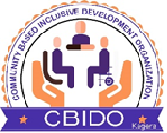In all areas we need both for our own staff as well as for all stakeholders to build their capacity via trainings. These trainings are cross cutting the different pillars in the CBR model.
Interventions capacity building
Conducting one day workshop to stakeholders
from both Karagwe and Kyerwa District, this is the good platform for CBIDO to building capacity of different stakeholders including teachers, local government leaders, religious leaders and health practitioners especially nurses and mid-Wives, Doctors, maternal and child health practitioner, Ward health officers for basic CBR issues on disability conditions as mentioned in introduction part. Why this kind of training, most of this stakeholders have high impact on issues concerning with acceptability, social inclusion and participation of CYWDs and for the health practitioners are responsible in helping pregnant mothers during pregnancy period, during delivery and after delivery when mothers are taking their babies for post natal clinics where if this important group of stakeholders are equipped with knowledge and skills will result to very kin delivery procedures, to reduce disabilities that are always happening during delivery due to irresponsibility’s and negligence’s, will also make early identification of both birth defects (physically seen direct after birth) and intellectual impairments especially during post natal clinics to children with very poor progresses. This is conducted by external facilitators, the hall is at KCBRP rehabilitation centre, social value added to this activity it strengthening collaboration and work relationship that simplify work issues to both field workers, VRWs and clients in terms of services from health centres, currently this activity will be done quarterly where one day session will have 75 participants.
Practical training to both parents and Village Rehabilitation Workers.
These are planned simple but practical trainings to both, VRWs and parents especially parents of children with some similarities in terms of the child conditions, or the social conditions through which the child is living such as social discrimination and isolation, parents have time to share experiences on how to better support and take care of their children regardless of the life hardship they are going through/passing through, CBIDO physiotherapist in collaboration with respective zone facilitator are responsible in handling the whole week session for 5 days, VRWs are joining the session to practically learn what physiotherapist do per each child so as they are able to make follow ups, but also they can use the gained skills/knowledge to help other many children from their respective village programmes, various topics such as feeding and nutrition, small businesses hygiene, therapies, child with disabilities acceptance in their families and communities, CBIDO also use this to tap many information on how the community perceives persons with disabilities so that the same information are used to sensitive the communities through Home visiting programmes, outreach and community radio programmes. The experiences shows that most parents who came for the parental trainings, are socially discriminated, isolated simply because of having children with disabilities, but within five days session, parents are gaining strengths due to psychological build up done by the responsible teams. Currently CBIDO will conduct one session monthly each session will comprise 10 children, being accompanied by their parents, they are offered with food, single transport and in some cases few are supported with go and return transport, accommodation costs are covered by CBIDO, this services is conducted using KCBRP Rehabilitation centre.
Intensive CBR trainings to Village Rehabilitation Workers ( VRWs).
This is the planned capacity building to Village rehabilitation workers on various issues to help them do their work effectively, it is on job training where it is done quarterly, for two days, topics to be covered for the first quarter are raised in the end of the year for this case they will be raised during the last meeting with VRWs in December, while the topics to be covered during the following quarters are raised depending on what are required to fulfil their obligations in their respective zones, as the zone facilitators together with Village rehabilitation workers deep it is important to do it. Some of the topics are include, Optical services, mobilization and strengthening Disabled People Associations, Parents groups and self-help groups, making and repairing assistive devices, Preventive measures on disability, Parent cantered approach of supporting children with disabilities, lobby and advocacy inclusive education, community engagement and participation in supporting persons with disabilities, it is expected for 20 VRWs, CBIDO covers go and return fare/transport, and other training costs ( food and beverage, accommodation, ).
On the other hand CBIDO is planning to exit from five current programme villages, and replace the same number of villages with new, this process will start taking place in July 2020 and will be repeated yearly, up to the last quarter five (5) new village rehabilitation workers be interviewed, and engaged /agreed to work with CBIDO there will be orientation and training sessions for new VRWs their training topics will be determined before the exit process starts in July each year. Their training days can not the same as those who have been in programme.

